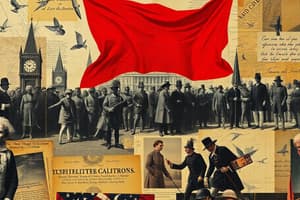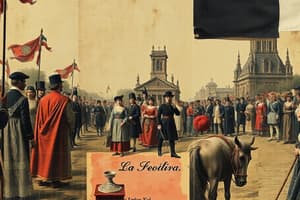Podcast
Questions and Answers
What was one of the key causes of the French Revolution?
What was one of the key causes of the French Revolution?
- Lack of access to natural resources
- Successful implementation of Enlightenment ideas
- Agricultural surplus
- Heavy involvement in the Seven Years' War (correct)
When did the French Revolution take place?
When did the French Revolution take place?
- 1820 to 1840
- 1787 to 1799 (correct)
- 1750 to 1775
- 1685 to 1695
What was the end result of the French Revolution?
What was the end result of the French Revolution?
- Establishment of a communist government
- Ascent of Napoleon Bonaparte as French Emperor (correct)
- Restoration of the Ancien Régime
- Rise of the Bourbon monarchy
What political thought influenced the French people towards revolution?
What political thought influenced the French people towards revolution?
What was the main grievance of the Third Estate in French society?
What was the main grievance of the Third Estate in French society?
Who led the call for reform and the establishment of a constitutional monarchy during the Estates-General?
Who led the call for reform and the establishment of a constitutional monarchy during the Estates-General?
Which event saw the execution of thousands of people in an effort to suppress counter-revolutionary elements?
Which event saw the execution of thousands of people in an effort to suppress counter-revolutionary elements?
What did the Declaration of the Rights of Man and Citizen legitimize?
What did the Declaration of the Rights of Man and Citizen legitimize?
What contributed to the rise of Napoleon Bonaparte as one of the most influential figures during the French Revolution?
What contributed to the rise of Napoleon Bonaparte as one of the most influential figures during the French Revolution?
What were the key causes that drove the French Revolution?
What were the key causes that drove the French Revolution?
Flashcards are hidden until you start studying
Study Notes
The French Revolution: Causes, Estates-General, Reign of Terror, Napoleon Bonaparte, and the Declaration of the Rights of Man
The French Revolution, which lasted from 1787 to 1799, was a period of radical social and political upheaval in France that began with the Estates-General. This revolution led to the collapse of the Bourbon monarchy, the rise of radical political factions, and ultimately the ascent of Napoleon Bonaparte as French Emperor. Here is a detailed exploration of the causes, key events, and significant figures of the French Revolution.
Causes
The French Revolution was a response to a complex set of circumstances, including the country's deepening financial crisis, the Enlightenment's influence on political thought, and the political, social, and economic inequalities inherent in the Ancien Régime. Some of the key causes of the French Revolution include:
- National Debt: France was heavily in debt due to its involvement in the Seven Years' War and the American Revolutionary War, and the monarchy had to borrow from the domestic and foreign creditors.
- Enlightenment Ideas: The Enlightenment's ideas of liberty, equality, and democracy influenced the political thought of the French people, pushing them towards a revolution.
- Social and Economic Inequality: The French society was divided into three estates, with the Third Estate (the common people) bearing the brunt of the tax burden while the First and Second Estates (the clergy and nobility) were exempt from many taxes.
Estates-General
In 1789, the Estates-General was convened for the first time in over 150 years to address the financial crisis. The Estates-General was a gathering of the three estates of the realm, with the Third Estate being the majority. The members of the Third Estate, who constituted the majority of the population, led the call for reform and the establishment of a constitutional monarchy.
Reign of Terror
Following the execution of King Louis XVI in 1793, the radical faction of the revolution, the Jacobins, led by Maximilien Robespierre, took control of the government. This period, known as the Reign of Terror, saw the execution of thousands of people, including many of the revolution's leaders, in an effort to suppress counter-revolutionary elements.
Napoleon Bonaparte
Napoleon Bonaparte, a military genius and a political strategist, emerged as the most powerful figure in France during the French Revolution. He led the French armies to victory in the Italian campaigns and the Egyptian campaign, becoming one of the most influential political and military figures in the period. Napoleon's rise to power culminated in his election as the First Consul of the French Republic in 1802.
Declaration of the Rights of Man
The Declaration of the Rights of Man and Citizen was a fundamental document adopted during the French Revolution. It outlined the fundamental human and civil rights that all the estate's members should enjoy, such as liberty, property, security, and resistance to oppression. The Declaration of the Rights of Man and Citizen was a cornerstone of the French Revolution, as it legitimized the revolution and created a new social and political order.
In conclusion, the French Revolution was a complex and multifaceted event that led to the collapse of the Bourbon monarchy, the rise of radical political factions, and ultimately the ascent of Napoleon Bonaparte as French Emperor. The revolution was driven by a combination of causes, including the country's deepening financial crisis, the Enlightenment's influence on political thought, and the political, social, and economic inequalities inherent in the Ancien Régime. Key events of the revolution include the Estates-General, the Reign of Terror, and the rise of Napoleon Bonaparte, while the Declaration of the Rights of Man served as a cornerstone of the new social and political order.
Studying That Suits You
Use AI to generate personalized quizzes and flashcards to suit your learning preferences.




